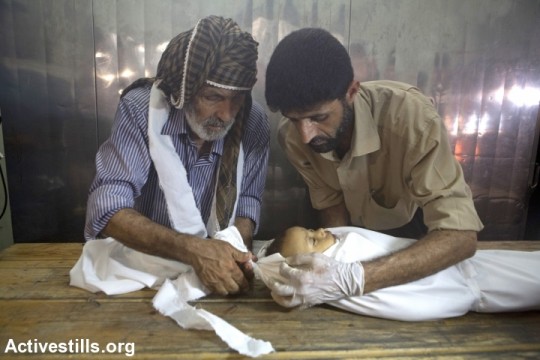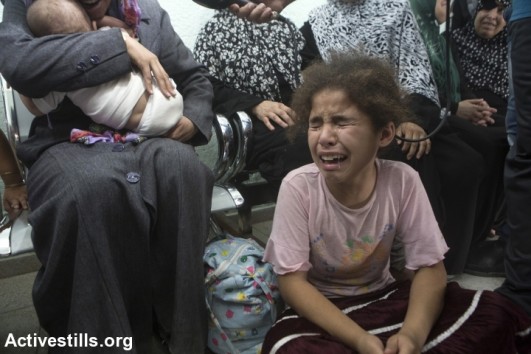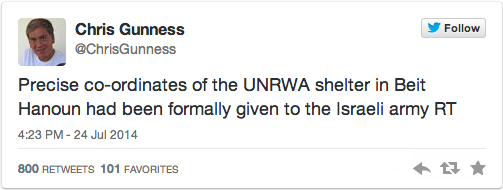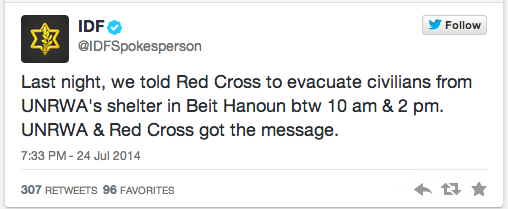Both sides are guilty of violating international law but the source of an attack on a Gaza UN school could be a game changer.
By Lolita Brayman
An attack on a United Nations-run facility in northern Gaza sheltering displaced Palestinians left at least 15 civilians killed and many more wounded on Thursday morning, reports indicate. Israel and Hamas are pointing fingers and negating responsibility for the deadly incident, the circumstances of which remain unclear but are significant in light of the UN Human Rights Council’s recent launch of a commission of inquiry into alleged Israeli war crimes.
The Israeli army is investigating the source of the hit, while UN General Secretary Ban Ki-moon condemned the attack and admitted in an official statement that the circumstances remain unclear. Israel denied intentionally targeting the school belonging to the UN Relief and Works Agency for Palestinian Refugees in the Near East (UNRWA), which is located in the densely populated northern Gaza town of Beit Hanoun, but did say that it fired mortars in the area after the army was shot at from a source nearby.
Both the Israeli army and UNRWA spokesperson Chris Gunness confirmed that Hamas rockets were being fired near the UNRWA school, and that sometimes Hamas rockets fall short of their intended Israeli targets. It is also confirmed that the exact location of the UNRWA shelter was known to the Israeli army and that several rockets fell in Beit Hanoun that same day. The army spokesperson also tweeted that the Red Cross was told to evacuate civilians from the UNRWA shelter between 10 a.m. and 2 p.m., as they were planning on targeting nearby Hamas rocket launchers. Gunness confirmed via his Twitter account that the precise coordinates of the school were formally given to the army.
The source of the attack seems to be one of the following possible scenarios: 1) A Hamas rocket was launched from Beit Hanoun aimed at Israel and fell short of its target, landing on the UNRWA school; 2) the Israeli army targeted the Hamas rocket launchers in Beit Hanoun and accidentally hit the shelter; or 3) Israeli forces responding to Hamas militant fire shelled the school accidentally by targeting the source of the fire.
In a rather ambiguous tweet, Gunness wrote: “UNRWA tried to coordinate with the Israeli army a window for civilians to leave and it was never granted.” This is vague because it is unclear whether the Israeli army or Hamas refused to grant the opportunity for civilians to evacuate – a very pivotal factor in determining which side would be liable for the violation of international law that resulted in a large number of civilian casualties.
If a Hamas rocket is found to be the cause of this latest tragedy, Hamas could be found liable for crimes against humanity under international humanitarian law and customary international law. By intentionally targeting Israeli civilians with rockets, Hamas is in violation of the strict law of war standard, whereby only military objectives are permitted as military targets. The mens rea (guilty mind) intent is not negated even though their target was not the victim – the Geneva Conventions distinguish civilians from combatants but not civilians from civilians.
If the Israeli army is found to be responsible for the deadly attack due to an accident while targeting a rocket launcher, it would not be in violation of targeting civilians because the mark was clearly a legitimate military objective. However, Israel’s precision would come into question and the issue of proportionality must then be addressed as a principle of international customary law. Attacks seen as excessive in relation to concrete and direct overall military advantage anticipated are considered unlawful.

The UN facility itself might be considered a legitimate military target since UNRWA schools have recently housed military objectives: On two separate occasions since the start of Operation Protective Edge, UN aid workers discovered a cache of weapons in UNRWA facilities and returned them to Gaza authorities. However, the Israeli army would not necessarily be absolved of responsibility for the civilians’ deaths even if it was found that proper evacuation procedures and warnings were effectively communicated. In international courts, Israel would still have to prove that the targeted buildings were making an effective contribution to Hamas’ military effort at the time it was attacked.
A similar legal analysis of proportionality would have to be assessed if the source was found to be Israeli artillery fire in response to Hamas militant fire.
It is indisputable that Hamas militants operate in urban and residential areas of the Strip, but whether they are guilty of using human shields is an extremely contested debate. It can be concluded from the Geneva Conventions, Additional Protocol I, and the Statute of the International Criminal court that a co-location of civilians and military objectives can amount to the use of human shields. Moreover, historic examples of this war crime have been cases where persons were actually taken to military objectives in order to shield them from attacks. Since UNRWA schools previously had hidden military objectives on their premises and then sheltered civilians in these buildings, the attack resembles – from a legal perspective – the use of human shields; however, more evidence would be needed to make this argument.
The tragic UNRWA hit comes a day after the UNHRC condemned Israel for its military operation and issued a commission of inquiry into alleged Israeli war crimes. The 49-member council backed the Palestinian-drafted resolution by 29 votes, with the U.S. being the only state to vote against the resolution. Although the condemnation is a far cry from actual UN judicial action – the Palestinian Authority has repeatedly threatened to seek redress from the International Criminal Court (ICC) – it places a significantly harsh international spotlight on Israel and delegitimizes military action in Gaza.

It is a little-known fact that international law is an ever-evolving field dependent on state actors, who sometimes take advantage of the law’s ambiguity in interpretation. The authenticity of seeking justice via UN courts should be questioned, because the threat alone can be manipulated into a political tool to delegitimize instead of persecute. The ICC in particular has limited authority in imposing international law convictions because many countries, including the U.S., China and Russia, are hesitant to become signatories; however, the court does influence policy making and what conflicts are worthy of media attention. In the Palestinian case, acceding to the Rome Statute – a necessary step for ICC action – would also open the Palestinian Authority to persecution for Hamas’ war crimes. This is a potentially disastrous move for the newly established and unstable Palestinian unity agreement.
International law and the media have a hard time distinguishing between legality and legitimacy. In a recent INSS report, Pnina Sharvit Baruch, a former legal advisor for the Israeli army, explained: “Issues touching on the legality of Israel’s actions are not synonymous with issues concerning the legitimacy of these actions in the international arena, and legal actions may still be deemed illegitimate.” The UNHRC commission is an example of this difference: Israel’s legitimacy was questioned, no actual judicial action was proscribed, and the very next day both sides violated international law, resulting in more casualties.
At the end of the day, international law might just be adding more fuel to the fire and feeding the media frenzy by blurring the lines between legality and legitimization, and Hamas and Israeli war crimes. The debate over fault in the UNRWA attack will hopefully draw attention to the political consequences of UN condemnations and its shortcomings in creating a facilitative environment for a ceasefire to materialize.
Lolita Brayman is a lawyer and former editor at Haaretz.com with an M.A. in conflict resolution and mediation from Tel Aviv University. Follow her on Twitter at @lolzlita
Related:
AP: UN shelter shelled; more than 140,000 displaced
Palestinian human rights leader: ‘Cast Lead was a joke compared to this’
Gaza ground invasion: Shedding the pretense of ‘precision’



